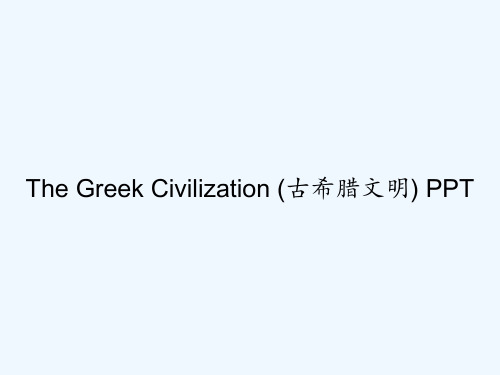最新西方文明史精品课件Part I-The Greek World新
- 格式:ppt
- 大小:8.53 MB
- 文档页数:54



西方文明史总结题型介绍英文部分: 选择10 * 2’判断10* 1’简答4 * 5’(英文表述)中文部分:论述2* 15’ 1 * 20’Chapter 1 The Greek World – The Age of Alexander the Greet1.Polis —城邦2.城邦社会结构(图在ppt上)自由人—libertinus 公民—polite 全权公民(成年男性)—full-citizenship奴隶—helot 外邦人—resident aliens 妇女—woman贵族—aristocrat 平民—commonerLimitation(局限性)a.不是现代意义上的民主,而是男性公民的民主(广大妇女,奴隶,外邦移民无权利)Not in the sense of modern democracy, but full-citizenships of democratic (the women, helot, andresident aliens without rights)b.即是伟大文明的催化剂,又是社会不公的一种暴力机器。
That is not only great civilization of catalyst, but also a kind of social injustice violence machine.The right of full-citizens(权利)a.political rulernd ownerc.polis defender(the hoplite phalanx重装步兵)3.Socrates, Plato and Aristotle(苏格拉底,柏拉图和亚里士多德)a.Socrates(苏格拉底)Know thyself!(认识你自己)Question everything(求索万物)Only the pursuit of goodness brings happiness(快乐从追求美德开始)b. Plato(柏拉图)The academy(雅典学院)Theory of ideas(理念论)The repubilc(理想国)Allegory of the cave(洞穴理论)Equality of man and woman(男女平等)Advocated instead the leadership of enlighted philosopher-king(哲学王) who would control rather than consult the masses.c.Aristotole(亚里士多德)“Golden Mean”(中庸之道)——everthing in moderationLogic(逻辑学)三人思想的异同Socrates:Plato’s teach er,advocated materialism(唯物主义),contributed more to educationand turned natrual research into human research in philosophy. He believed that in the pursuit of natural truth is endless(把哲学从研究自然转向研究自我,他认为对于自然的真理的追求是无穷尽的)Plato:Aritotle’s teacher,advocated id ealism(唯心主义). He believed that the world is consisted of “idea of the world” and “reasonable world”Aristotle: Encyclopedic scholar, advocated materialism(唯物主义), viewed that education is country function.4.polysism(多神教)5.“Hellenistic” Greece:希腊化时代—Hellenistic(希腊化)=Greek-like6.Alexandar the Great(综合评价)a.one of the most fascinating and controversal figures of historyb. he had an active,searching mind and a great love of physical exertion(运用)c.he was arrogant,but maintained a cool,self-control in the midst of actiond. his fame was enhanced by his ablity to inspire courage in his soldierse. he often got the jump on his enemies,outmaneuvering(以计谋获胜) them before they even knew what was going onf.Alexander was also exceedingly clever and acted decisively(果断的) when others hesitatedg. He could anticipate success and intuitively(直觉的) knew how to cope with(处理) each situationh. He took risks and when the outcome was in doubt,defied uncertainty, and managed each situation with boldnessi.He had a larger vision to bring together many races under one ruler and under one form of government. His goal was to make humankind a single poepleChapter 2 The Roman Republic—Origins,Breakdown and Rebirth1.Fouding of Rome(800BC)罗马城市的建立The legend of Romulus and Remus2.powers of the western meditertaneanGreeks and Carthaginians(迦太基人)3.The conquest of ItalyBy 270BC,Rome had expanded to the southern tip of Italy,had succeeded in establishing contractual alliances(联盟)4.Rome and Carthage(迦太基)—Power of the western mediterraneana.the carthaginians, who had established a commercial hegemony(贸易霸权) believed that the ascendant(优势的) Rome threatened their control of the ragionb.The Carthaginian (Punic) wars 布匿战争(三次)First Punic war- fought over Sicilian citySecond Punic war –Hannibal(汉尼拔)of carthage led army across Alps into ItalyThird Punic war –North Africa becomes Roman province5.罗马共和社会的表现形态Consul(执政官)代替行使国家权力,两名执政官互相牵制Senate(元老院)元老院有权批准、认可法律,并通过执政官掌管财政外交,统辖行省和实施重大宗教措施等。


